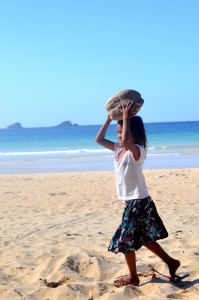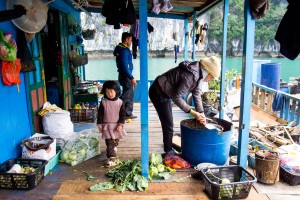Written by Lea Crowley
Two days after moving to my placement city, a coteacher called me and told me an administrator from the school was sending her daughter, Amy, to my apartment to show me around town. I imagine there had been rumors floating around the school about the new foreign teacher’s disaster of an apartment, and that the administrator wanted to see if there was any truth to them. Amy soon saw for herself the state of my apartment—broken windows, no sink, the smell of sewage and lots of bugs — and called her mother to let her know. When she finished the phone call, she encouraged me to stay in her family’s apartment until my living situation was sorted out.
That night, I met 엄마 (omma) for the first time. Omma—the Korean equivalent of “mom” or “mommy”—was an intimidating woman. Although she’s tiny (maybe five feet tall, probably under 110 pounds) her presence immediately commands any room she enters. She speaks in a thick regional dialect, uses lots of slang, and constantly barks orders at her children and coworkers. The night I met her, I was nervous, covered in mysterious bug bites and incapable of carrying a conversation in Korean. I was pitiful, I’m sure. I wasn’t prepared for how powerless I felt. Until moving into my apartment, I had considered myself well-prepared for living abroad. I soon learned that I was mistaken, and working out my apartment debacle made it painfully clear that I had no idea what was going on in Korea.
From the moment I stepped into her home, Omma took care of me. For the next few nights, I would sit quietly on an oversized rocking chair, internally thanking the universe for introducing her into my life as she made tutting sounds and smeared gooey pink medicine over the welts that covered my face, neck and arms. For the first time since coming to Korea, I finally felt like I could make myself at home. Because of Omma’s sudden dedication to my happiness and health, I felt like I belonged.
As Omma tended to my bug bites one night, I silently reflected on my pre-arrival preparations. After being accepted to Fulbright, I frantically began trying to familiarize myself with my future home. I listened to Korean pop music over and over, did Wikipedia searches of Korean celebrities, followed Korean fashion blogs, and attempted to teach myself the Korean alphabet. I believed that knowing about these things would somehow lessen the impact of culture shock and make it easier to befriend Koreans.

This search for an “in” to Korean society continued at Fulbright Orientation, where I listened to lecture after lecture on Korean culture. One concept in particular grabbed my attention: 정 (jeong). Even though my understanding of jeong was limited and I struggled to articulate what exactly it was, I was eager to experience it. I kept waiting for a thunderclap of inexplicable affection, but I just didn’t feel that strong, immediate and undeniable connection. The reality sunk in that maybe I would not experience jeong with anyone in Korea.
But then I met Omma. Despite her no-nonsense attitude, she took me into her home, cooked for me and seemed genuinely concerned about me. I constantly thanked her in Korean for doing so much for me, although I could not come close to expressing the extent of my gratitude. During one of my many clumsy attempts to thank her, I asked “Why?” in Korean. I didn’t understand how she could take a pitiful foreign stranger into her home so easily. She determinedly looked into my eyes and said simply, “You are good woman” in heavily accented English. I was taken aback because I had never heard her speak English before. But more importantly, I was shocked at the air of finality she spoke with that made it all clear. She was saying she felt jeong with me, too. I had finally found it.
A few days later, I moved out of her home and began settling into my new apartment. To my delight, our relationship continued to grow at school. I regularly visited her in her office and tried to speak to her in Korean. She hoarded snacks in her desk to share with me, and patiently listened to my atrocious Korean to tease out what I was trying to communicate. We spent hours chatting back and forth, relying heavily on a translation app she installed on her phone specifically for the purpose of talking to me.
Whenever she got the impression that I liked or wanted something, she immediately tried to make it happen for me. For example, when I told her that I wanted to go swimming, she personally drove me to the local pool – to the amusement and shock of the Koreans present – and showed me around. If I said I liked a certain food, she brought some to school for me the next day. Sometimes, she even lugged full bags of groceries to school for me. Even though I couldn’t understand most of what she said at first, the sound of her voice comforted me. I will be the first to admit that she talks to me like I am still a child, but I still love the way she coos “Aigooo, Lea-ya!” at me whenever I do something that makes her happy.

Sometime during the course of our relationship, we began saying “Korean mom” and “American mom” to differentiate between her and my actual mother. She is my Korean mom, and occasionally she would ask about my American mom. I began opening up to her about my relationship with my American mom, which has been tumultuous to say the least. To my surprise, she replied by saying she experiences the same struggles with her Korean daughter. I had witnessed some of the lower points of their relationship, but I didn’t expect my Korean mom to openly acknowledge it as an issue.
The few times I saw them together, Omma criticized her daughter sharply and often. Whether it was her clothes, her makeup, her English ability, her hobbies, or her opinions, Omma would relentlessly criticize and nitpick at Amy’s choices. It seemed that Amy had become so accustomed to being berated by her mother that she could effortlessly put on a stoic expression and ignore it until it was over. Although my American mother does not criticize me in the way that Omma criticizes Amy, I noticed that both of our relationships suffer from a lack of understanding and communication. Given the situation with my American mother, hearing Omma acknowledge her difficult relationship with her daughter really hit home for me.
Listening to Omma’s perspective, I could understand where she was coming from. Because I have been in Amy’s shoes more times than I can count, I could also sympathize with her point of view. Like my American mother and I, Omma and Amy both love each other; however, showing that affection is difficult for them because their personalities are so inherently different. I see how much Omma loves her daughter: she has Amy’s picture as the background on her phone, she pours her resources into Amy’s education, and talks about Amy often. I never tried to understand my American mother’s perspective before, and I regret not doing it sooner. Thanks to Omma, I realized that despite all of the issues I have with my American mother, I know that she loves me more than she can possibly explain. She’s my biggest fan, and she always has been. To my surprise, I began to feel a connection to my American mon, similar to the one I had grown so used to sharing with my Korean mom. Feeling this jeong toward my American mom has positively affected the way I interact with her, and I can tell how delighted she is at the unexpected change in our relationship.
I doubt my Korean mother understands the extent to which she has affected my experience in Korea. She is the main motivation for me to study Korean. She is the reason I stay healthy, because going to the gym with her is something that I look forward to every day. I worry about her health, and do my best to brighten her day as often as possible. I almost renewed my contract in Korea just because I wasn’t sure if I would be ready to say goodbye to her when the time came.

I have talked to Omma about my decision to leave Korea, and she expressed support and understanding. Although she still teases me to stay for one more year, I know she realizes that it’s time for me to go back home. Omma and I plan on facing the unknown of long-distance jeong together. I can only hope that we can continue building our relationship, despite the distance and time difference. I realize that maintaining a relationship across obstacles of space, time, and language can be stressful and overwhelming, but my relationship with Omma has been so rewarding that I am determined to make communicating with her a regular part of my life, regardless of where I live. Considering I feel noticeably less happy on the days I do not see Omma at school, I think not seeing her for months or years at a time will be difficult. But our connection is so strong that I feel sure I will return to Korea; I will discover jeong once more.
Lea Crowley is a 2014-2015 EETA at Duho Elementary School in Pohang, Gyeongsangbuk-do.
